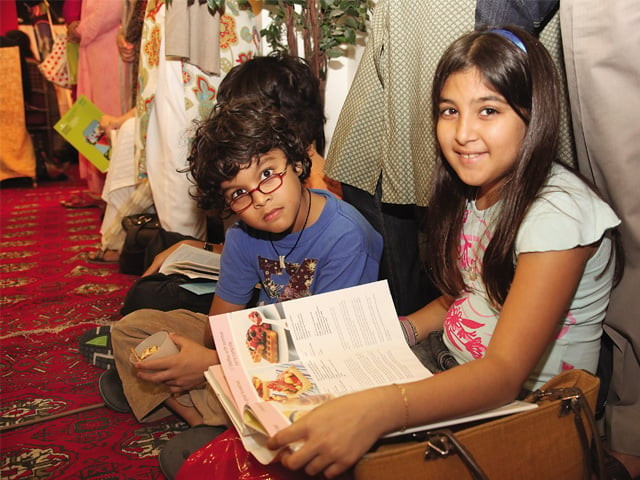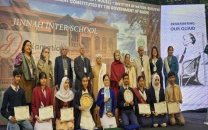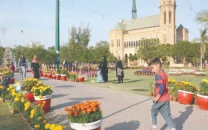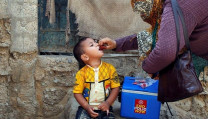A trip back to naani’s storytime
Visitors, young and old alike, to the ‘Khail Khail Mein’ story-telling session got a dose of nostalgia.

A trip back to naani’s storytime
Little children between the ages of four to 14 sat enthralled, some cross-legged and others on their shins, on the carpet in front of the stage as three prominent children’s writers read out their stories. Other children chose to sit on the chairs with their parents or squirmed out of their grip to play a quick game of tag or hide and seek before being reprimanded to sit quietly and “listen!”
There was one group of children in uniform that had come to attend the session as a school trip on a Sunday.
Although the session began a few minutes late, parents kept streaming in with excited children in colourful t-shirts and cute bubblegumer shoes. At the end of the session, a few parents who had gathered up to meet the writers complained that they had really wanted to attend the session but had run late.
The session started with Mahnaz Malik’s talk on her book ‘Mo ka Tara’ which is the translated version by Fahmida Riaz of Malik’s famed ‘Mo’s Star’. Malik had brought a stuffed replica of Mo, the penguin protagonist. This part of the session was kept interactive as Malik asked the children questions about penguins and Antarctica, where the story plays out. Malik went on to explain how Mo spots a star which he wants to reach. “So how does Mo go to the star?” she asked.
Tiny hands shot up from the audience. “He can fly!” cried out one child.
When Malik said Mo could not fly, another child yelled, “He can go to a tall mountan!”
“He can call the star down!” said another one, causing ripples of laughter.
The next talk was by Saman Shamsie who read out parts from her book ‘The Adventures of the Slothful Slough-Off’, a story about a blue snake and its quest to make friends with other animals. This session too was interactive as Shamsie kept asking questions about the story and about the snake’s behaviour. The issue of trust that helps the snake make friends was also discussed by the author.
The last session was by far the most lively of all. Writer Zara Mumtaz, a true grandmother-like figure, kept the audience mesmerised by her story ‘Kawa aur Maina ke bachay’ as she mimicked the birds.
The children were also drawn into the story as they tried to interpret the actions of the crow and the myna and guessed what would happen next. Some children also shared the personal experiences they have had with such birds.
Mumtaz urged the children to chant the crow’s words with her each time they were repeated in the story. The principle line of the book was repeated many times by an enthusiastic Mumtaz and the excited children: “Khao chirri ki chochlay matkao ucha!”
Mumtaz was reading a story that is a part of her forthcoming book Anna Buwa ki Kahaniyan, a collection of ten stories that she calls part of the oral tradition of our society. “The aim is to bring the old stories back again and to make them known to children,” she told The Express Tribune. “This is the oral tradition that has been passed on to us, but it will be lost if not preserved.”
Parents and teachers flocked around Mumtaz after the session, asking her if she could conduct a story-telling session at their home and school. “Do you charge if you come to schools?” asked a teacher of a private school in Karachi.
“No, I do not charge,” said Mumtaz who has been writing and reading for children since 1965. “My reward is the happiness of the children who I see.”
Mumtaz’s books come with audio CDs and she is eager to see her next book published by the Oxford University Press.
Appreciation for the effort echoed among parents and children. “It was an excellent session,” said Ambreen Ashar, who had come with her two children. “The way she was explaining and giving a lively performance reminded you of the old times when grandmothers would tell stories. Sadly, that rarely happens now. It was especially good since it taught children good morals.”
When asked what morals they had learned, her daughter 12-year-old Eraj said, “We should not be greedy.” Nine-year-old Arsalan said, “We should not take others’ things.”
“I think the opportunity children got to interact and discuss was a wonderful experience,” said Maliha Hassan who had come with her two daughters. “I feel such events should be held on a regular basis.”
Published in The Express Tribune, February 7th, 2011.


















COMMENTS
Comments are moderated and generally will be posted if they are on-topic and not abusive.
For more information, please see our Comments FAQ